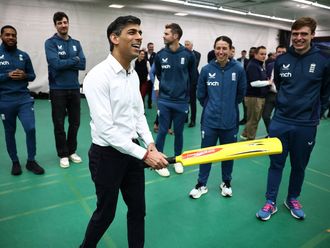The Secretaries-General
Trygve Lie, Norway (1946-1952): Prior to his election as the first secretary-general of the United Nations, Lie led the Norwegian delegation to the UN Conference on International Organisation in San Francisco, April 1945; chaired Commission III, which drafted the Security Council provisions of the UN charter; and in 1946 he led the Norwegian delegation to the UN General Assembly in London. While in office, Lie supported UN intervention in the Korean War and the foundation of Israel and Indonesia. He also advocated UN recognition of People’s Republic of China upon the exile of the Nationalist government.
Dag Hammarskjold, Sweden (1953-1961): Dag Hammarskjold was unanimously elected to two terms as secretary-general and served until September 18, 1961, when he died in a plane crash en route to a peace mission in the Congo. Hammarskjold’s most significant contributions to the UN’s mission include promotion of Armistice Agreements between Israel and the Arab States; the 1956 establishment of the UN Emergency Force (UNEF); and multiple visits to countries in Africa, Asia, Europe, the Americas, and the Middle East to acquaint himself with officials of member governments and problems in specific areas.
U. Thant, Myanmar (1961-1971): U. Thant served as acting secretary-general after Dag Hammarskjold’s death. Just over a year later, the General Assembly voted unanimously to make him secretary-general. At the time of his appointment, Thant was the permanent representative of Burma to the UN, and had previously chaired the UN Congo Conciliation Commission and the Committee on a UN Capital Development Fund. Under his leadership, the UN facilitated the end of the Cuban missile crisis and allayed civil war in the Congo.
Kurt Waldheim, Austria (1971-1982): Waldheim was the permanent representative of Austria to the United Nations. During his two-term leadership of the UN, Waldheim participated in the Paris International Conference on Vietnam and presided over the first phase of the Geneva Peace Conference on the Middle East. Five years after his second term ended, Waldheim was elected President of Austria, a post he held until 1992; however, during the campaign his service in the German Army came to light. Though he declared no personal involvement, Waldheim was implicated in Nazi atrocities in the Balkans during the Second World War and was subsequently barred from entering the US by the Justice Department.
Javier Perez de Cuellar, Peru (1982-1991): Perez de Cuellar was Peru’s ambassador to Switzerland, the Soviet Union, Poland, and Venezuela; served as his nation’s permanent representative to the United Nations; and represented Peru on the Security Council. In 1979, he was appointed under-secretary-general for special political affairs. He oversaw negotiations for the release of American hostages in Lebanon, facilitated the withdrawal of Soviet troops from Afghanistan, negotiated the ceasefire ending the Iran-Iraq War, and developed the 1991 UN-backed peace pact in Cambodia.
Boutros Boutros-Ghali, Egypt (1992-1996): Boutros-Ghali served one term as secretary-general. His term in office was marked by increased operating costs and ineffective peacekeeping efforts that proved burdensome to the UN. Unsuccessful US participation in Somali peacekeeping operations, inability to curb fighting in Bosnia and Croatia, and subsequent reluctance from the international community to act against genocide in Rwanda, all precipitated US support to veto his reappointment.
Kofi Annan, Ghana (1997-2006): Kofi Annan began his career with the World Health Organisation (WHO) and rose through the ranks to become UN under-secretary-general and, in 1995, he was appointed the secretary-general’s special representative to the former Yugoslavia. Under his leadership, the UN executed contemporary platforms aimed at sustainable development in Africa and the utilisation of global capitalism to benefit socioeconomic needs. His Millennium Report advocates initiatives to eradicate poverty, combat HIV/AIDS, and protect the environment.
Ban Ki-moon, Korea (2007 — present): Ban Ki-moon was South Korea’s Minister of Foreign Affairs and Trade. He joined the Korean Ministry of Foreign Affairs in 1970, and served in diplomatic roles at embassies in the US, Austria, and India. In 2001, Ban started work at the United Nations as chief of staff to Han Seung-soo, the president of the General Assembly. Ban returned to Korea after his term and served as Minister of Foreign Affairs and Trade from 2004 until 2006.
How is the Secretary-General elected?
The only guiding text is Article 97 of the United Nations Charter, which states that “The Secretary-General shall be appointed by the General Assembly upon the recommendation of the Security Council.” As a result, the selection is subject to the veto of any of the five permanent members of the Security Council.
The candidates
Irina Bokova, Bulgaria: Acting Minister of Foreign Affairs (1996—1997); Director-General of Unesco (2009 — present).
Helen Clark, New Zealand: Prime Minister of New Zealand (1999—2008); Administrator of the United Nations Development Programme (2009 — present).
Natalia Gherman, Moldova: Minister of Foreign Affairs and European Integration of Moldova (2013—2016), and Acting Prime Minister of Moldova (2015).
Antonio Guterres, Portugal: Prime Minister of Portugal (1995—2002); United Nations High Commissioner for Refugees (2005—2015).
Vuk Jeremic, Serbia: Minister of Foreign Affairs of Serbia (2007—2012); President of the United Nations General Assembly (2012—2013).
Srgjan Kerim, Macedonia: Minister of Foreign Affairs of Macedonia (2000—2001); President of the United Nations General Assembly (2007—2008).
Miroslav Lajcak, Slovakia: High Representative for Bosnia and Herzegovina (2007—2009); Minister of Foreign Affairs of Slovakia (2009—2010; 2012 — present).
Susana Malcorra, Argentina: Under-Secretary-General of the United Nations for Field Support (2008—2012); Chef de Cabinet of the United Nations Secretariat (2012—2015); Minister of Foreign Affairs of Argentina (2015 — present).
Danilo Turk, Slovenia: Slovenian Ambassador to the United Nations (1991—2000); Assistant Secretary General of the United Nations for Political Affairs (2000—2005); President of Slovenia (2007—2012).











